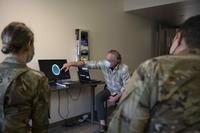 MILITARY UPDATE: Sky-High Price Has VA Rationing New Hepatitis C Drug
MILITARY UPDATE: Sky-High Price Has VA Rationing New Hepatitis C Drug
Sen. Bernie Sanders (I-Vt.) used one of his last hearings as chairman of the Senate Veterans Affairs Committee to review how VA has had to ration a break-through medicine that cures hepatitis C, a liver virus infecting 174,000 veterans, because a course of treatment – 84 pills over 12 weeks -- costs VA almost $50,000 per patient.
Sanders said the biopharmaceutical company Gilead Sciences, Inc., of Foster City, Calif., stands to earn more than $200 billion on a new drug called Sovaldi. When combined with still toxic antiviral medicines including interferon injections, Sovaldi cures hepatitis C at a 90 percent rate, and does so faster and with fewer side effects than past drug regimens.
That a cure has been found is good news, Sanders said, especially for veterans who are infected with hepatitis C at three times the rate of the general population. Vietnam War-era vets are hit particularly hard because of battlefield blood exposure, non-sterile vaccination routines, wartime sharing of razors, drug abuse and recruit demographics from the last draft era.
What’s disturbing and “astounding,” Sanders said, are pill prices set by Gilead. VA has budgeted $1.3 billion to buy Sovaldi over the next two years to treat mostly patients with advance liver disease or liver cancer, said Michael Valentino, chief consultant for VA Pharmacy Benefits Management Services. There’s money enough for 25,000 to 30,000 patients, he said.
If VA had an unlimited drug budget, said Dr. David Ross, director of HIV, hepatitis C and public health pathogens programs for VA, it would provide Sovaldi at least to half and perhaps two-thirds of the 174,000 vets infected with the virus. Some are better off waiting, Ross explained, because medicines are being developed that, unlike Sovaldi, will not have to be taken in combination with more toxic drugs.
At the hearing this month, Sanders had executives from public interest groups that lobby for more affordable medicines join him in criticizing Gilead’s prices and profits for treating a virus that infects 3.2 million Americans. They reviewed how a small drug research firm, Pharmasset, developed Sovaldi as a first-ever oral treatment for hepatitis C, replacing painful injections. Gilead then bought Pharmasset in 2011 for $11 billion.
By then only $68 million had been spent to develop the drug, and total development costs were less than $100 million, said Robert Weissman, president of Public Citizen, a non-profit that tries to stop pharmaceutical company abuses. He said his information on R&D costs was pulled from company filings with federal regulators.
Weissman also confirmed for Sanders that Gilead has recovered its original $11 billion investment in just the past year of Sovaldi sales.
Profits are accumulating fast because Gilead priced its drug for individuals and health insurance plans in the private sector at $1000 a pill, or $84,000 for a full course of treatment. Gilead’s manufacturing costs for those 84 pills fall between $150 and $250, Weissman estimated.
Gilead spokeswoman Cara Miller didn’t challenge those figures. But she said in an email that the “pharma industry has invested $50 billion in the development of hepatitis C drugs over the last 20 years.” Also, she said, clinical testing of Sovaldi included six “Phase 3 clinical trials” with all but one “initiated by Gilead after the acquisition of Pharmasset.”
Regarding the pill’s price, she said, it “reflects the value of the medicine…Sovaldi offers a cure at a price that will reduce hepatitis C treatment costs in the short-term and deliver significant healthcare savings to the healthcare system over the long-term.”
VA negotiated with Gilead to lower its cost per pill to $596, said Michael Valentino, chief consultant for VA pharmacy benefits management services. In fiscal 2014, VA gave the drug to 5400 veterans at a cost to taxpayers of $275 million. Sanders said that cost for one medicine is unsustainable and limits VA spending on other critical health care needs.
Gilead didn’t send anyone to testify at the hearing. But Sen. Richard Burr (N.C.), ranking Republican on the committee, said it was wrong for Sanders to focus solely on pill price without considering the effect on patients’ quality of life or costs that VA avoids because patients no longer face more painful or intrusive treatments including liver transplants. Without such comparisons, Burr said, “we dumb ourselves down.”
Sanders had noted in his opening statement that before Sovaldi, the primary method of treating hepatitis C was injected medicines with terribly painful side effects. He conceded too that earlier treatments were expensive, exceeding $270,000 over a 10-year period for seriously ill patients, and that the cost of a liver transplant averages $577,000.
Burr also argued that company profits attract investors and those dollars, in turn, finance development of follow-on drug therapies, for example a hepatitis C medicine, expected soon, that won’t need to be combined with toxic drugs like interferon to cure patients.
But John Rother, president of the National Coalition on Health Care, said the price Gilead charges for Sovaldi reflects a disturbing trend across the pharmaceutical industry that drives the costs of specialty drugs ever higher.
“Gilead to their credit has not tried to justify price on the basis of R&D because they can’t,” Rother said. Instead, company executives have conceded they set pills prices by reviewing the cost of treatments that Sovaldi replaces and then adding 20 percent or so, he said.
“I call that escalator pricing,” Rother said, because drug prices will always climb higher, regardless of what it costs to develop them.
Sanders referred to a news report that Gilead is producing a generic version of Sovaldi to be sold in developing countries for $10 a pill versus $596 paid by VA. Soon, he said with sarcasm, VA will have to go to Egypt to buy enough of the drug to treat all of America’s veterans who need it.
“It’s deplorable that due to the high price tag VA might not be able to offer this treatment to all who qualify,” Sanders said. “That’s a moral issue.”
Miller confirmed that Gilead has tiered pricing to make the drug more affordable in developing countries like India and Egypt where incomes are low and infection rates much higher than in United States. The “starting point” for negotiating with those governments is $900 for 84 pills, she said.
Send comments to Military Update, P.O. Box 231111, Centreville, VA, 20120, email milupdate@aol.com or twitter: Tom Philpott @Military_Update
# # # # #
Tom Philpott has been breaking news for and about military people since 1977. After service in the Coast Guard, and 17 years as a reporter and senior editor with Army Times Publishing Company, Tom launched "Military Update," his syndicated weekly news column, in 1994. "Military Update" features timely news and analysis on issues affecting active duty members, reservists, retirees and their families.
Visit Tom Philpott's Military Update Archive to view his past articles.
Tom also edits a reader reaction column, "Military Forum." The online "home" for both features is Military.com.
 Tom's freelance articles have appeared in numerous magazines including The New Yorker, Reader's Digest and Washingtonian. His critically-acclaimed book, Glory Denied, on the extraordinary ordeal and heroism of Col. Floyd "Jim" Thompson, the longest-held prisoner of war in American history, is available in hardcover and paperback.
Tom's freelance articles have appeared in numerous magazines including The New Yorker, Reader's Digest and Washingtonian. His critically-acclaimed book, Glory Denied, on the extraordinary ordeal and heroism of Col. Floyd "Jim" Thompson, the longest-held prisoner of war in American history, is available in hardcover and paperback.



